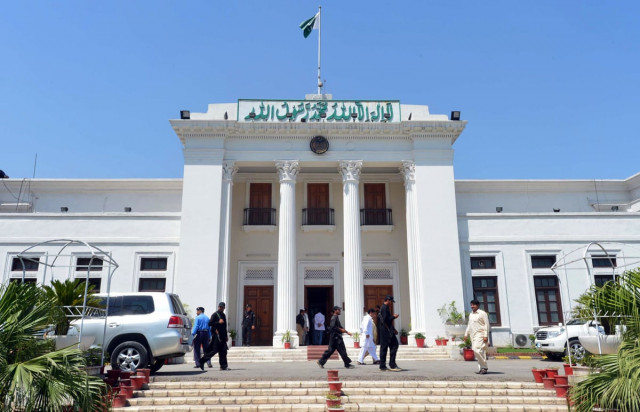K-P’s invisible act of power
Facing stiff opposition, most PCSW-drafted bills yet to be passed by the province

A week back I visited a female government employee to inquire about the status of laws concerning women in Khyber-Pakhtunkhwa. She obliged by giving me some brief information on the subject which included praises for the government’s efforts and mention of special contribution by a bearded senior computer operator who happened to be seated in her office along with another woman. After a brief conversation, I handed her my visiting card and departed.
Almost an hour later, the same lady rang me up in a hysterical state. She said soon after I left, the very computer operator she had spoken highly of humiliated her and threatened her by saying she’ll face an inquiry by the department for speaking to a journalist. The frightened lady kept calling daily afterwards until I assured her that her identity would be protected in my report.
This incident illustrates the poor implementation of the Centre’s 2010 Protection against Harassment of Women at Workplace Act in the province. Although the Act extends to the whole of Pakistan, it’s execution in K-P is blocked as the province has yet to appoint the ombudsperson – mandatory under Section 7 of the Act – who is required to have served as a High Court judge or is qualified to be appointed as one. “Former minister for social welfare, special education and women empowerment Dr Mehar Taj Roghani wanted to appoint a female as the ombudsperson, but she failed to find such a lady and the slot is still vacant,” said an insider privy to the matter.
Moreover, Section 3 of the Act requires the establishment of an ‘Inquiry Committee’ in each organisation chaired by three people, including one female. K-P’s Social Welfare Secretary Syed Abdul Jabbar Shah told The Express Tribune, “Committees (Inquiry Committees) have been established at each department and are functional,” but insiders in his department say otherwise. According to them, so far only letters have been issued to all government departments and organisations to form the committee, but no efforts have been made to determine whether these committees have been set up or are even operational.
Compared to Sindh and Punjab – both provinces have appointed ombudspersons and passed Domestic Violence (Prevention and Protection) Act, 2013 and Protection of Women against Violence Act 2015, respectively – K-P is still struggling to pass the Khyber-Pakhtunkhwa Domestic Violence (Prevention and Protection) Bill. The first draft of the bill was tabled in the assembly during the ANP-led government by PPP MPA Noor Sehar in August 2012, but was opposed by Mufti Kifayatullah of JUI-F on the grounds that it reflected western values and was referred to a house committee for further deliberation. The Provincial Commission on Status of Women (PCSW) later drafted another bill on the subject which has currently been sent to the Council of Islamic Ideology (CII) to make sure it conforms with the injunctions of Islam.
Most PCSW-drafted bills are yet to be passed by the legislature. According to women’s rights activist and PCSW member Shabina Ayaz, “The Law Department destroys our efforts”. Ayaz was also against sending the bill to CII, saying, “When Sindh and Punjab’s bills were not sent to CII, why should the K-P government send its bill? When something concerns women it is considered contradictory to Islam.” Ayaz was not very hopeful about the bill’s passing because of the right-wing majority in the provincial assembly. “Even PTI lawmakers walked out of the House when Punjab’s women protection bill was passed,” she adds.
But K-P Law Department’s legal drafter Shagufta Naveed explains the bills they received from the Social Welfare Department were sent back with their views. She accused the department for working too slowly. “We had asked the Social Welfare Department to send the Domestic Violence Bill to CII two years back. [Only] when the chief minister asked them to act upon the views of the Law Department was the bill sent to CII,” she says. The department’s secretary, Shah, confirmed the bill was forwarded to the CII on January 25, 2016.
The bill in Punjab created controversy and we wanted the K-P bill to be cleared from the CII first to avoid this, maintains Naveed. “It is not that we don’t want the bill to pass; we want it to be in accordance with the teachings of Islam,” she explains.
Published in The Express Tribune, March 8th, 2016.












COMMENTS
Comments are moderated and generally will be posted if they are on-topic and not abusive.
For more information, please see our Comments FAQ